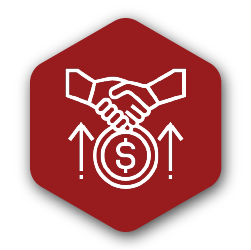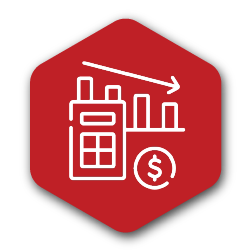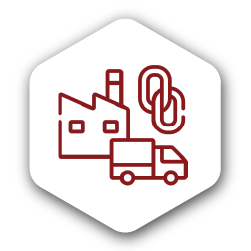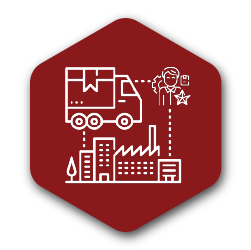Good, dependable partnerships are critical if you want to go far in the retail industry. While there are plenty of different alliances that we could be referring to, in this context, we’re focusing on the relationships you have with your suppliers. Are they good? Strong? Mutually beneficial? If you can answer yes to these questions, you are in a healthy position.
On the other hand, if you know that your relationships with your suppliers are not as robust as they should or could be, it's time to correct that. It's especially true if you consider that your partnership with your suppliers is more critical than ever before.
Without a healthy relationship with your suppliers, you’ll struggle to compete in the market.
So why is this relationship critical to your success? Maybe you already know the answer to that. Or perhaps you don’t. Regardless, it’s worth unpacking the question. It’s also important to point out that there is not just one answer to this question. Instead, there are multiple. Even more so, it’s not just you - the retailer - who benefits. Your suppliers benefit too.
You can benefit from supplier expertise and data
Are you interested in improving your product assortment, and understanding your customers and what they buy while boosting your sales? Of course, you are. However, you can’t achieve all of this by yourself. You need a partner.
One of those partners can be a supplier. Or suppliers if you run a large store that stocks dozens of categories. Considering your suppliers are exposed to the retail market - the chances are high that they supply other retailers too - they have experience and knowledge, both of which you must harness.
Here's a breakdown of some of the information suppliers can provide you:
- Market share;
- Market trends;
- Consumer hierarchies; and
- Recommended pricing.
Your suppliers are also knowledgeable about their brands and the competitive landscape of the category in which they compete. Why wouldn’t you want to know how to understand more about the categories that you stock?
Just think of what you can achieve in the context of this point.
Determine the ideal product assortmentBy understanding which of your products performs the best, you can look to order more of it to capitalise on those sales. Meanwhile, you can also ensure these items get more space and the best possible position on the shelf to enhance your profitability.
Identify opportunity gaps
Because you’re keeping an open line of communication with your suppliers, you’re sharing information about how to improve your category. More about that in our second point. But it’s worth sharing it here to reiterate its importance. It also goes hand-in-hand with new product developments.
Let’s say, for example, that your supplier spots a gap in your product offering. In this instance, they are the category captain. With this information in hand, they can approach you and negotiate to bring in products that will fill the gap and provide you with additional sales. They also benefit since they’re further entrenching their reputation and growing sales for the products they supply.
Now imagine you didn’t have access to that? Or you do have access, but your partnership wasn’t as solid as it could be. If you don’t actively engage with your suppliers, you’ll miss these opportunities and that can damage your partnership.
 Your supplier can help grow the categories you stock
Your supplier can help grow the categories you stock
Above, we mentioned that your suppliers can help you grow the categories they supply by sharing information with you. That is not the only way that they can achieve that.
They also use data-driven planograms.
By providing data-driven planograms for you - either through a specialist software and services provider or using specialist software like DotActiv - your suppliers can assist you in showcasing how to position products on a shelf for maximum sales.
You can also use these planograms to understand your current store layout (via a realogram) and a proposed data-driven planogram.
This two-part process gives you a visual understanding of any problematic factors in a category as well as its beneficial factors to make informed decisions.
Since your suppliers are experts in the category, you can rest assured that whatever ideas they put forward will be in your best interests. More importantly, it’ll help you grow your categories and increase your sales.
It also helps if you have set up a formalised collaboration program with your suppliers. Doing so ensures no confusion about what’s expected from each other. More importantly, it shows that you value their input.
Here’s a real example of how collaborating with suppliers can equate to sustained growth.
Let’s say that you’re a pharmacy retailer and you have a supplier who provides products in the Self-Medication category. In this instance, they (the category captain) might approach you to assist in improving the category.
You might have been using an alphabetical merchandising technique, which isn’t proving to be as profitable as you’d like. It’s also harming sales for your supplier so they have a vested interest in finding a solution. Your supplier could then reach out to DotActiv to create data-driven planograms that focus on shopper behaviour.
The result? The new planograms and merchandising techniques helped increase sales for the category by over 23%.
 You can reduce costs and improve your efficiency
You can reduce costs and improve your efficiency
Healthy retailer-supplier relationships come with trust, loyalty and preferential treatment that is highly dependent on mutual benefits.
Such a relationship allows you to negotiate for rebates, preference and exclusivity on new product launches and flexible payment terms. These negotiations can also help you to reduce costs and streamline your process.
On the other hand, it can help your suppliers understand your business better and cater more effectively to your needs. Remember, this is all about having a mutually-beneficial relationship. Once your suppliers have a better understanding of your business, it can improve efficiency in the supply chain by:
- Reducing stock delivery turnaround times;
- Easier mitigation of ordering process concerns;
- Reduction in out-of-stocks; and
- Reduction in quality issues.
Let’s consider what improved efficiency means for you as a retailer.
You’re considered a one-stop shopping destination for all edible groceries. Why? Because you have established a good relationship with your larger suppliers, who, in turn, give you first preference when it comes to the supply of products.
Because of their efficient ERP ordering system, flexible payment plans and high weekly movement of products, you can entrench yourself as the store of choice for edible groceries. Now, again, imagine the impact on your efficiency when you don’t have that strong, healthy relationship.
In a world that is still struggling with the aftermath of COVID-19, and where the retail supply chain can break down, the last thing you want is to have a poor relationship with your suppliers.
 You can consolidate the supply chain
You can consolidate the supply chain
A fourth and final reason why you need to ensure you have a positive, sustainable relationship is because of the image it can have on the supply chain. In this context, it leads to a consolidated supply chain.
How?
For one, you can streamline your supply chain. Then there is the fact that you can also reduce complexity and improve both lead times and product availability. And don't forget about an increase in idea sharing relating to improved efficiency (mentioned in the point above).
Those are all the positives when it comes to consolidating your supply chain. However, it’s just as critical to show you the consequences when you fail to strengthen it.
Here are a few consequences:
- Stockout issues due to an ERP that is not connected or integrated;
- Longer lead times, which exacerbates any stockout issues;
- Negative retailer-supplier relationships due to unreliability and unnecessarily complicated discount negotiations, which leads to increased costs;
- Negative customer shopping experience due to low stock levels on shelves;
- Loss of sales due to stock out issues;
- Low planogram compliance due to low stock levels of products that need to be merchandised and weak retailer-supplier relationships.
These are just a few of the issues that you could face. Each one on its own should be enough of an argument as to why you need to consolidate your supply chain where necessary. More importantly, it points to the fact that you need to have a reliable, healthy relationship with your suppliers in the first place so that the above doesn’t happen - at all. And if you do ever struggle with these challenges, you can find a solution by speaking to your suppliers.
Conclusion
Any positive retailer-supplier relationship is enhanced through the sharing of valuable data, insights and expertise. Such relationships are also based on mutually beneficial agreements centred around trust that open up the opportunity for cost-saving, leading to improved efficiency and collaboration.
It's the type of partnership that you should strive to foster as a retailer or supplier because without, let’s be honest - you wouldn’t be able to be successful without it.
Are you looking to get more shelf space for your products in-store? Or need advice on how to negotiate with your suppliers? Book a custom exploratory consultation with a DotActiv expert and we’ll help you.
About the contributors
Brian Nyamachiri joined DotActiv in 2013. An operations manager with over 10 years of retail experience, he currently oversees Adcock Ingram, Danone, GSK, Dr Oetker, Loreal, Makro, Premier Foods, Revlon, and UPD accounts as operations manager. He has a Bachelor of Commerce in Supply Chain and Operations Management from Unisa.
Maryka Fourie joined DotActiv in 2021 as a space planner, working to deliver data-driven planograms to L’Oréal. She has a Bachelor of Consumer Science (Honours) from the North-West University.
Sanmari Roberts joined DotActiv in 2021 as a space planner and works on various ad-hoc accounts, including Premier Foods, Danone and Dr. Oetker. She has a BPhil (Honours) in Marketing Management from the IMM Graduate School.
Siphesihle Ndlozi joined DotActiv at the end of 2019 and has worked on several accounts including Liquor City and Dis-Chem and is currently a space planner at Adcock Ingram. She completed her Bachelor of Arts in Fashion at LISOF (now known as STADIO).



